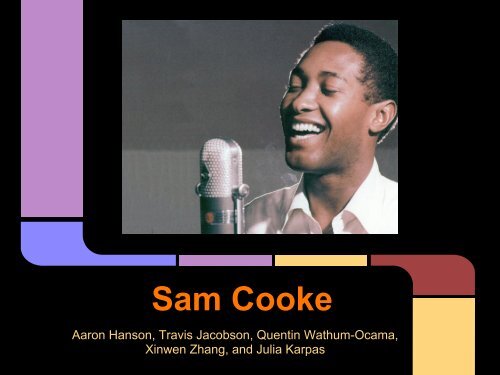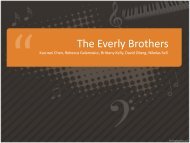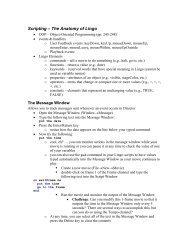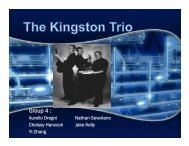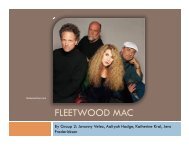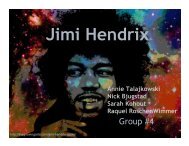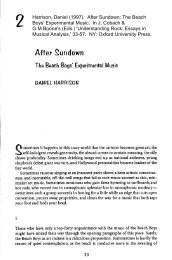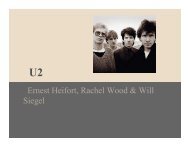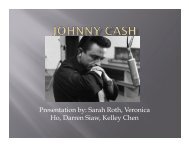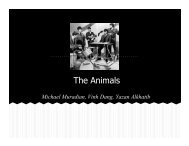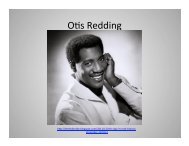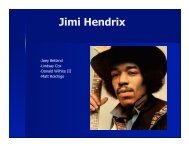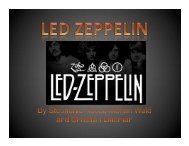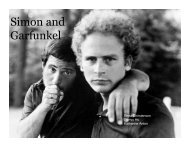Sam Cooke - Scott D. Lipscomb
Sam Cooke - Scott D. Lipscomb
Sam Cooke - Scott D. Lipscomb
Create successful ePaper yourself
Turn your PDF publications into a flip-book with our unique Google optimized e-Paper software.
<strong>Sam</strong> <strong>Cooke</strong><br />
Aaron Hanson, Travis Jacobson, Quentin Wathum-Ocama,<br />
Xinwen Zhang, and Julia Karpas
"The King of Soul"<br />
<strong>Sam</strong> <strong>Cooke</strong> is one of the legendary voices of<br />
the 20th century. He is commonly credited as<br />
one of Soul music's originators. His blend of<br />
Gospel and R&B would be the blueprint for<br />
this dynamic genre which was rooted in the<br />
struggles of the civil rights era.<br />
("You Send Me" on American<br />
Bandstand)
Why This Topic Was Selected<br />
<strong>Sam</strong> <strong>Cooke</strong> is a very important figure in many<br />
musical genres including rock and roll. He not<br />
only lead the way for the transition of many other<br />
gospel artists to secular music, but he also built<br />
the early foundation for soul music to grow off of.<br />
He also, ina span of 7 years, had 29 Top 40 hits in<br />
the U.S. and was also a successful entrepreneur.<br />
Overall, <strong>Sam</strong> <strong>Cooke</strong>, is an interesting topic based<br />
off of his wide range of skills alone. Not many<br />
people have had a greater effect on the music<br />
industry when compared to <strong>Sam</strong> <strong>Cooke</strong>.
Basic Background Information<br />
● Birth name: <strong>Sam</strong>uel <strong>Cooke</strong><br />
● Stage name: <strong>Sam</strong> <strong>Cooke</strong><br />
● Born: January 22nd, 1931<br />
● Died: December 11, 1964 (homicide)<br />
● Birthplace: Clarksdale, Mississippi<br />
● Parents:<br />
○ Father: Charles Cook Sr.<br />
○ Annie May Cook<br />
● Had seven other brothers and sisters
Background Information (cont.)<br />
Attended high school in Chicago<br />
Genres: Rhythm and Blues, Soul,<br />
Gospel, and Pop<br />
Labels: Specialty, Keen, and RCA<br />
●<br />
Singer/Songwriter
Musical Information<br />
● Formed a gospel singing group with some of<br />
his siblings called "The Singing Children."[2]<br />
○<br />
○<br />
Often opened for their father, who was a Baptist<br />
Minister<br />
<strong>Sam</strong> was nine years old at the time<br />
● When he was fifteen, he became the<br />
frontman for a bigger teenage group called<br />
the "Highway QC's." [2]<br />
○<br />
○<br />
They traveled on a gospel circuit and performed on<br />
some radio shows<br />
During this time he trained with a man named R.B.<br />
Robinson, who was a baritone of the Soul Stirrers.
Musical Information (cont.)<br />
●<br />
●<br />
●<br />
When <strong>Sam</strong> was 19, he was asked to audition for the<br />
Soul Stirrers after lead singer R.H. Harris left due to<br />
illness. He made it after his very first try. [1]<br />
From the first Soul Stirrers recording he was in,<br />
"Jesus Gave Me Water," <strong>Sam</strong> became an icon in the<br />
gospel field, [1]<br />
In 1957, due to his financial situation, so he says,<br />
<strong>Sam</strong> explored crossing over into popular, secular<br />
music. He released a song through Specialty under<br />
the name Dale Cook, called "Lovable." He tried to<br />
make people believe it was his brother Dale, but at<br />
this point in his career his voice was way too<br />
noticeable. [1]
Musical Information (cont.)<br />
●<br />
●<br />
●<br />
He could not continue to do both, so<br />
he left the Soul Stirrers. [2]<br />
○ Crossing over to secular music was<br />
seen as a sin by some, so the Soul<br />
Stirrers were booed, etc. while <strong>Sam</strong><br />
was still a part of the group.<br />
He only recorded a few singles with<br />
Specialty before he signed with Keen<br />
in June of 1957<br />
Recorded a few hits here including<br />
"You Send Me," which sold more than<br />
1.5 million copies. [1]<br />
○ This recording established him as a<br />
commercial artist and a pop style<br />
singer. [2]
Musical Information (cont.)<br />
● In 1960, he signed with RCA after a<br />
royalty dispute with Keen. [2]<br />
● They initially wanted <strong>Sam</strong> to be the black<br />
counterpart of Elvis Presley. [1]<br />
○<br />
His first single under this idea was "Teenage<br />
Sonata," which did not fair well.<br />
● He went back to his original style and<br />
upon recording his own "Chain Gang" he<br />
started his eventual course to greatness.<br />
[1]<br />
● Every single released after this was a hit,<br />
even after his death. [1]
Musical Information (cont.)<br />
● His touring schedules were very extensive [1]<br />
○<br />
●<br />
He toured all around the U.S. as well as in England and<br />
Army bases in Germany.<br />
The year of 1964, the last year of his life, was a very<br />
important one because a lot happened.<br />
○ Wrote "A Change is Gonna Come"<br />
○ Sang this on the Tonight Show with Johnny Carson<br />
○ It also became a civil rights classic
Awards and Accomplishments<br />
● Some of his top hits with Keen include:<br />
○<br />
"You Send Me", "Everybody Loves to Cha Cha<br />
Cha", "Only Sixteen", and "Wonderful World".<br />
● Some of his hits (that are still popular<br />
today) with RCA include:<br />
○<br />
"Cupid", "Another Saturday Night", and "Twisten<br />
the Night Away"<br />
● In 1986, the Rock and Roll Hall of Fame<br />
was founded, and <strong>Cooke</strong> was one of the<br />
first of only ten inductees. [1]<br />
● He is also a part of the Songwriter's Hall of<br />
Fame. [1]
Musical Style<br />
<strong>Sam</strong> <strong>Cooke</strong>'s style comprises of a somewhat wide range<br />
of musical styles of his period.<br />
● He was commercially popular in the early 1950s<br />
up until his death in 1964 and after. (Some of his<br />
music is still popular to this day!)<br />
● During this time period the roots of rock and roll<br />
(Pop, C&W, and R&B) and the emergence of the<br />
basic rock and roll styles (Mainstream, Rockabilly,<br />
and Soft Rock) were the popular genres.
Musical Style (cont.)<br />
● <strong>Sam</strong>'s style:<br />
○<br />
○<br />
○<br />
■<br />
■<br />
■<br />
○<br />
His roots are tied to Gospel music.<br />
He was a successful Gospel and Pop singer.<br />
Pop characteristics:<br />
Crooning, professional style vocals<br />
Urban enunciation<br />
Avoided use of explicit, offensive lyrics<br />
■ Avoided improvisational additions<br />
Gospel/Soul Characteristics<br />
■<br />
■<br />
Soulful interpolations<br />
Vocal Melismas (his biggest relation to Soul)<br />
● His vocals were emotional, but not raspy<br />
■ Avoided typical Gospel/Soul shouting style
How does this music fit into the<br />
evolution of Rock & Roll?<br />
<strong>Sam</strong> <strong>Cooke</strong> fits into the evolution of rock and roll in a few<br />
major ways. First, he was one of the first, and lead many<br />
others, to cross over from gospel music into the commercially<br />
popular markets (due to segregation practices of the time, this<br />
typically means white music/markets like pop, etc.).<br />
Therefore, in essence, he is responsible for the gospel style<br />
characteristics found in some modern rock and roll. Second,<br />
based of his popularity and success in the roots of rock<br />
genres (specifically pop), he can be attributed with helping<br />
start the rock and roll fad. Lastly, bringing his gospel style to<br />
the secular world also made him one of the first people to lay<br />
groundwork for the eventual uprising of the Soul genre. This<br />
is most obviously noticed through the vocal style of some of<br />
his songs (use of vocal melismas and soulful interpolations).
Were there unique and/or innovative<br />
elements of the musical/performance style?<br />
As mentioned, <strong>Sam</strong> <strong>Cooke</strong><br />
lead the way for gospel artists<br />
to cross over to the<br />
commercially popular genres<br />
like, for example, pop. He also<br />
was one of the first singers to<br />
lay the groundwork for soul<br />
music. This is most obviously<br />
heard through the vocal style<br />
of some of his songs (use of<br />
vocal melismas and soulful<br />
interpolations).
Song Analysis "A Change is<br />
Gonna Come"<br />
Released in 1964 as a single, "A Change is Gonna Come" become known<br />
not only as <strong>Sam</strong> <strong>Cooke</strong>'s greatest works but one of the most cherished<br />
songs of the civil rights era. Inspired by Bob Dylan's "Blowin' in the Wind",<br />
<strong>Cooke</strong> wrote the song after an incident where he was arrested and jailed<br />
for refusing to leave a Los Angeles hotel that wouldn't honor his reservation<br />
because of his race. The song became an anthem of the era and while it<br />
was a mild hit for <strong>Cooke</strong>, its message and music has prevailed for decades.<br />
(it was used in the film Malcolm X and has been covered dozens of times<br />
by a wide variety of artists) Near the time of it's release <strong>Cooke</strong> was shot in<br />
a bizarre altercation with a motel manager and would never see the long<br />
lasting and far reaching impact of the song.
Discussion of Musical Elements and<br />
Structures in "A Change is Gonna Come"<br />
● Orchestral arrangement of strings, horns (including<br />
french horn), bass, and drums<br />
● Meter: Could be read as 6/8 or a slow 4/4<br />
● Beat Subdivision: Could be read as either triple or<br />
double<br />
● Texture: Melody and Accompaniment Homophony<br />
● Musical Form: A A' A'' B A'''<br />
● Timbre: It has an overall feel of a mixture between<br />
soul/gospel and pop music.<br />
○<br />
○<br />
Orchestra Style Accompaniment<br />
Vocals sound crisp, clear, and professional but he<br />
also sings the song with an intensity and passion<br />
that stems from his gospel roots.
<strong>Sam</strong> <strong>Cooke</strong> the Businessman<br />
As <strong>Sam</strong> <strong>Cooke</strong> continued to break ground musically by<br />
blending gospel and R&B while crossing over with<br />
several pop hits, he was breaking ground in the<br />
business side of the music industry that had not been<br />
achieved. He would open the door for many more black<br />
artists to capitalize on their record sales in ways that had<br />
never been possible before. Being one of the very first of<br />
his era to take interest in and control of his own<br />
copyright protection. His own publishing company called<br />
Kags music and a year later he began his own record<br />
company. SAR Records allowed for <strong>Sam</strong> to control his<br />
own career in a very powerful way. [11]
<strong>Sam</strong> <strong>Cooke</strong> the Businessman<br />
This type of control over his material and ability to<br />
maximize profit had never been seen and would become<br />
even more the standard after Ray Charles took things<br />
the same direction. <strong>Sam</strong> used his power with SAR<br />
Records to help start careers of other young black artists<br />
such as Bobby Womack, Johnny Taylor, Billy Preston,<br />
and others. It can be said that he is the first African-<br />
American music mogul. [11]
Influences on <strong>Sam</strong> <strong>Cooke</strong><br />
● Influenced by different genres of music,<br />
including Gospel, Pop, and Rhythm and<br />
Blues, which he shaped into Soul music.<br />
[9]<br />
○<br />
○<br />
<strong>Sam</strong> <strong>Cooke</strong>'s earlier career as a member of the<br />
gospel group the Highway QC's helped in the<br />
development of not only his talent but style<br />
The pop influence is noticeable in his singing,<br />
which is a crooning style,and his use of pure clear<br />
vocals
Influences on <strong>Sam</strong> <strong>Cooke</strong> (cont.)<br />
● R.H. Harris/ The Soul Stirrers<br />
○<br />
<strong>Sam</strong> <strong>Cooke</strong> has called Harris his "major stylistic<br />
influence."<br />
● Bob Dylan<br />
○<br />
After hearing Bob Dylan's "Blowin' in the Wind",<br />
<strong>Sam</strong> <strong>Cooke</strong> was upset he had not written that<br />
song "before a white man", which led to his<br />
writing of "A Change is Gonna Come". [10]<br />
Bob Dylan<br />
R.H. Harris
Influences on <strong>Sam</strong> <strong>Cooke</strong> (cont.)<br />
Even though Bob Dylan influenced <strong>Sam</strong><br />
<strong>Cooke</strong>, it is interesting that <strong>Sam</strong> <strong>Cooke</strong><br />
influenced Bob Dylan as a young boy:<br />
● “At midnight the gospel stuff would start,” he said,<br />
referring to the Shreveport station. “I got to be<br />
acquainted with the Swan Silvertones and the Dixie<br />
Hummingbirds, the Highway QC’s and all that." [13]
<strong>Sam</strong> <strong>Cooke</strong>'s Influence<br />
<strong>Cooke</strong> influenced many artists, including Otis Redding,<br />
Michael Jackson, The Heptones, Smokey Robinson<br />
(phrasing), Marvin Gaye (songwriting), Lou Rawls,<br />
Aretha Franklin, John Legend, and more.
<strong>Sam</strong> <strong>Cooke</strong>'s Influence (cont.) [12]<br />
Of the many musicians that were influenced by <strong>Sam</strong><br />
<strong>Cooke</strong>, some of them were also his own peers. They<br />
described <strong>Cooke</strong> in many different ways:<br />
● Smokey Robinson described <strong>Sam</strong> <strong>Cooke</strong>'s style of<br />
music as "So unique and so awesome."<br />
● Lou Rawls once said that "To this day still there are<br />
many, many people around the world that still love<br />
this man singing his music. Because he wrote great<br />
songs, man."<br />
● James Brown was quoted saying that "<strong>Sam</strong> <strong>Cooke</strong>,<br />
there will never be another like that soul brother."
<strong>Sam</strong> <strong>Cooke</strong>'s Influence (cont.) [7]<br />
● <strong>Cooke</strong> led a crossover movement for<br />
black singers from gospel to the white<br />
market of Pop.<br />
● <strong>Cooke</strong> influenced John Legend, which can<br />
be seen in his music and lyrics, especially<br />
in the song "I Can Change", in which<br />
<strong>Cooke</strong> is mentioned.<br />
● Otis Redding, Smokey Robinson, and<br />
Marvin Gaye would all have different<br />
singing styles without the influence of<br />
<strong>Cooke</strong>.
<strong>Cooke</strong>'s Untimely and Violent Death<br />
To this day many questions remain surrounding the death of <strong>Sam</strong><br />
<strong>Cooke</strong>. What is known is that he was shot by a motel manager after<br />
<strong>Cooke</strong> entered her office late one evening after bringing a young<br />
woman there. The manager claims that he broke down the door in a<br />
rage and grabbed her asking, "Where is the girl?". Fearing for her life<br />
she broke free and grabbed a pistol, shooting three times and hitting<br />
him once. The girl had run from the motel to call the police. She<br />
claimed that <strong>Cooke</strong> had kidnapped her and attempted to rape her. She<br />
claimed that while <strong>Cooke</strong> used the bathroom she grabbed a pile of<br />
clothes, (some of which were <strong>Cooke</strong>'s) and ran for it. This explains why<br />
when the shooter saw <strong>Cooke</strong> he was wearing only blazer and a shoe.<br />
What is troubling is that many eye witnesses with <strong>Cooke</strong> that evening<br />
saw that he was carrying thousands of dollars cash and when searched<br />
by the police they only found 108 dollars on him. What is also peculiar<br />
is that witnesses saw the girl walk to the motel willingly where <strong>Sam</strong><br />
<strong>Cooke</strong>, a very famous singer, signed for the room in his real name. The<br />
girls profession at the time would not be known to the courtroom which<br />
later would be revealing. Some time after the trial, she was arrested for<br />
prostitution. The general theory now is that after a night of heavy<br />
drinking, <strong>Cooke</strong> escorted the girl to the motel, checked in, and after a<br />
while went to use the bathroom which is when the girl grabbed his<br />
things and ran in an attempt to rob him. Upon discovering this he<br />
stormed the office door which <strong>Cooke</strong> saw the girl knocking on<br />
moments before. This was the altercation that led to his shooting.
Other Events of The Period (1960s)
The Music Scene During and<br />
Following <strong>Sam</strong> <strong>Cooke</strong>'s Time<br />
In 1960s, Elvis returned to the music scene from the US Army, joining the other<br />
white male vocalist at the top of the charts; Bobby Darin, Neil Sedaka, Jerry Lee<br />
Lewis, Paul Anka, Del Shannon and Frankie Avalon. America, however, was ready<br />
for a change. The Tamla Motown Record Company came on the scene,<br />
specializing in black rhythm and blues, aided in the emergence of female groups<br />
such as Gladys Knight and the Pips, Martha and the Vandellas, the Supremes, and<br />
Aretha Franklin, as well as some black men, including Smokey Robinson, James<br />
Brown, Jimi Hendrix, and the Temptations. Bob Dylan helped bring about a folk<br />
music revival, along with Joan Baez and Peter, Paul & Mary. The Beach Boys<br />
began recording music that appealed to high schoolers. The Beatles, from England,<br />
burst into popularity with innovative rock music that appealed to all ages. The<br />
Righteous Brothers were a popular white duo who used African American styling<br />
to create distinctive sound.
1960s<br />
"The 60's were a leap in human consciousness.<br />
Mahatma Gandhi, Malcolm X, Martin Luther<br />
King, Che Guevara, Mother Tersea, they led a<br />
revolution of conscience. The Beatles, The Doors,<br />
Jimi Hendrix created revolution and evolution<br />
themes. The music was like Dali, with many<br />
colors and revolutionary ways. The youth of<br />
today must go there to find themselves."<br />
--Carlos Santana
Popular music entered an era of "all hits", as numerous artists released recordings,<br />
beginning in the 1950s, as 45-rpm "singles" (with another on the flip side), and<br />
radio stations tended to play only the most popular of the wide variety of records<br />
being made. Also, bands tended to record only the best of their songs as a chance to<br />
become a hit record. The taste of the American listeners expanded from the<br />
folksinger, doo-wop and saxophone sounds of the 1950s to the Motown sound, folk<br />
rock and the British Invasion. The Los Angeles and San Francisco Sound began in<br />
this period with many popular bands coming out of LA and the Haight-Ashbury<br />
district, well known for its hippie culture. The rise of the counterculture movement,<br />
particularly among the youth, created a market for rock, soul, pop, reggae and<br />
blues music.
References<br />
1. Biography. Songs of <strong>Sam</strong> <strong>Cooke</strong>. Retrieved June 5th, 2012. From http://www.songsofsamcooke.com/biography.htm<br />
2. Peneny, DK. (1998). <strong>Sam</strong> <strong>Cooke</strong>. History of Rock. Retrieved June 5th, 2012. From http://www.history-of-rock.com/cooke.htm<br />
3. Goodwin, S. and Bradley, B . (1999). 1960-1969. American Cultural History.<br />
Lone Star College-Kingwood Library, Kingwood, TX. Retrieved from<br />
http://wwwappskc.lonestar.edu/popculture/decade60.html<br />
4. W. Everett, The Beatles as musicians: the Quarry Men through Rubber Soul (Oxford: Oxford University Press, 2001), pp.<br />
37-8.<br />
5. V. Bogdanov, C. Woodstra and S. T. Erlewine, All Music Guide to Rock: the Definitive Guide to Rock, Pop, and Soul<br />
(Milwaukee, WI: Backbeat Books, 3rd edn., 2002), ISBN 0-87930-653-X, p. 1333.<br />
6. (2010) <strong>Sam</strong> <strong>Cooke</strong> Biography. Rock and Roll Hall of Fame. Retrieved June 5th, 2012. From http://rockhall.<br />
com/inductees/sam-cooke/bio/<br />
7. (2008). <strong>Sam</strong> <strong>Cooke</strong>- Biography. LetSingIt. Retrieved June 5th, 2012. From http://artists.letssingit.com/sam-cooke-3x5c8<br />
/biography
References<br />
8. Guralnick, P. (2005). Dream Boogie: The Triumph of <strong>Sam</strong> <strong>Cooke</strong>. New York, NY: Little, Brown and Company.<br />
9. Palmer, R. (1986) The Pop Life. The New York Times. Retrieved June 5th, 2012. From http://www.nytimes.com.<br />
10. Rowles, D. (2010). The Black Elvis. Pajiba. Retrieved June 5th, 2012. From http://www.pajiba.com/pajiba_storytellers/story<br />
tellers-the-black-elvis-sam-cookes-a-change-is-gonna-come.php<br />
11. Sanjek, D. (1997). One Size Does Not Fit All: The Precarious Position of the African American Entrepreneur in Post-World War II<br />
American Popular Music. American Music, Vol. 15, No. 4, pp. 535-562.<br />
12. <strong>Sam</strong> <strong>Cooke</strong>: Crossing Over. Dir. John Antonelli. Perf. Danny Glover. Public Broadcasting Service, 2010. Transcript.<br />
13. Marshall, <strong>Scott</strong> M., and Marcia Ford. Restless Pilgrim: The Spiritual Journey of Bob Dylan. Lake Mary, FL: Relevant, 2002. Print.<br />
14. Krajicek, D. (2011) The Death of <strong>Sam</strong> <strong>Cooke</strong>. The Crime Library. Retrieved June 6th, 2010. From http://www.trutv.com/<br />
library/crime/notorious_murders/celebrity/sam_cooke/index.html<br />
15. Eder, B. (n.d.) <strong>Sam</strong> <strong>Cooke</strong> - Biography. All Music. Retrieved June 6th. From http://www.allmusic.com/artist/sam-cookemn0000238115


